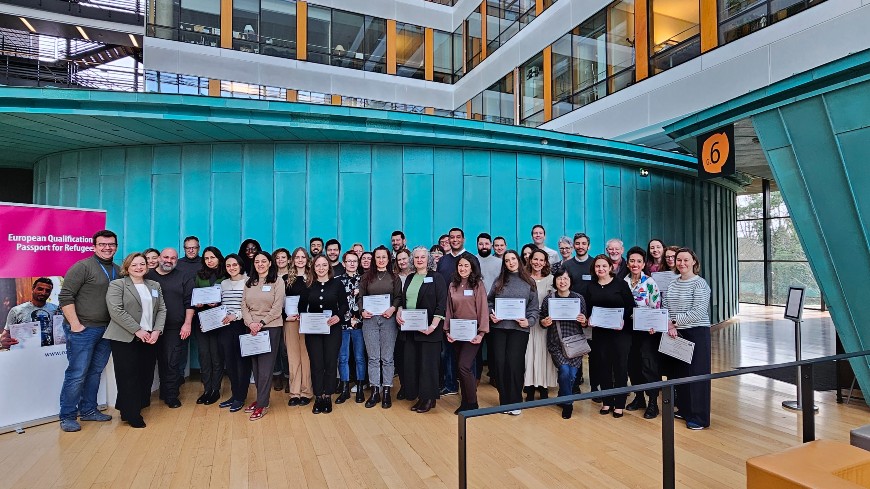The first meeting of the Council of Europe Sub-Group on Higher Education Policy in Strasbourg was held on 14 February in Strasbourg, focusing on the ways to support refugees to use their qualifications effectively in their host communities and how to most efficiently assist them in employment, further education, and socail integration.
Since 2017 the Council of Europe has been promoting the European Qualifications Passport for Refugees (EQPR) as an important instrument to assist member States in addressing the challenges brought by the refugee crisis. The EQPR centres on fairness, ensuring that each refugee's qualifications are assessed exclusively on merit, keeping their aspirations alive. This approach recognises the potential of individuals who have faced significant disruptions in their academic or professional journeys.
The work achieved so far has led the Education Department to start drafting a Council of Europe Committee of Ministers’ Recommendation on Valuing the Academic and Professional skills of Refugees in Europe. The Recommendation will be accompanied by Guidelines to maximise benefits from the use of the EQPR for facilitating and ensuring admission to further higher education studies and access to labour market for refugees. Elaboration of policy guidelines may help clarify the lead at institutional level for putting in place mechanisms and partnerships at the national, regional, and local levels to enhance coherence of approach to ensure the refugee students’ more successful local and regional integration, labour insertion and to support lifelong learning opportunities for their host societies.
The Council of Europe Sub-Group on Higher Education Policy supported will oversee the drafting process of this important instruments.
From 20 to 22 February, 36 credential evaluators from 10 national recognition centers partners in the EQPR, completed the training on its methodology.
In addition to completing the training, they also put into practice the knowledge gained by conducting online assessments of refugees’ qualifications. Indeed, 18 refugees have had their qualifications assessed and the result of the assessments will be known in the first weeks of March.
Implemented by the Council of Europe since 2017, the EQPR helps refugees rebuild their lives in their host countries by giving them the opportunity to have their qualifications assessed even in the absence of full documentation.
To do so, the EQPR methodology is based on a self-assessment questionnaire completed by the refugee and a structured interview. The interview is conducted by a team of two credentials evaluators from different ENICs (national information centre on recognition), at least one of whom has expert knowledge of the language and education system of the country from which the applicant claims to have his/her qualification.
EQPR is a tool developed by the Council of Europe to help Member States to address the challenges brought by the refugee crisis, by building the capacity for the sustainable response to the possible crisis situations in the future.
Thanks to its tested and credible methodology, EQPR has been able to quickly adapt to the recent crises, providing, for example a quick response to support persons fleeing from the war in Ukraine.
Taking part in the meeting of UNESCO's Strategic Advisory Group (SAG) for the UNESCO Qualifications Passport (UQP), Villano Qiriazi, Head of the Education Department of the Council of Europe, shared the Council's ambitions for the European Qualifications Passport for Refugees for the years 2024 to 2027.
Emphasising the Council of Europe's education strategy, in particular the theme 'Enhancing the social responsibility and responsiveness of education', Qiriazi outlined a multidimensional approach to enhance the implementation of the EQPR.
The meeting underscored the spirit of cooperation between international organisations in addressing the educational challenges faced by vulnerable groups, particularly refugees. In this context, the Council of Europe aims to increase the impact of the EQPR through:
Policy development: Proposing the creation of a Council of Europe legal instrument, possibly as a Recommendation of the Committee of Ministers. This would focus on valuing the academic and vocational skills of refugees in Europe and provide a set of principles and guidelines for member states.
Practical enlargement: The Council aims to significantly increase the number of countries participating in the EQPR by 2027, targeting at least 50% of Council of Europe member states. This expansion will be supported by promotional activities, in particular by using the ENIC and NARIC networks and by supporting projects through ENIC calls for proposals.
Cooperation with UNESCO: Strengthen links with UNESCO to promote the EQPR across the European region and align it as a key instrument in the implementation of the UNESCO Global Convention, thereby ensuring educational opportunities and recognition for all learners.
This SAG meeting highlighted not only the progress of the UNESCO Qualifications Passport, but also the synergy between UNESCO and the Council of Europe. The inclusion of the EQPR in the dialogue reflects a shared commitment to facilitating access to and recognition of education for refugees and vulnerable migrants, in line with global education standards and humanitarian principles. The meeting set a positive and ambitious agenda for the coming year, with both UNESCO and the Council of Europe committed to expanding frameworks for educational access and recognition.
For more information on the EQPR, please visit the project webpage




